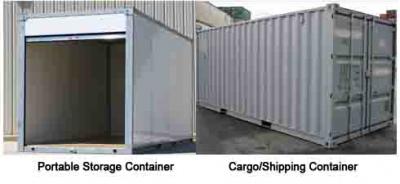What's The Difference Between A Cargo Container And A Portable Storage Container?

Are you confused about the difference between a portable storage container and a shipping or cargo container? There's no need to be embarrassed, many people are. Unless you're working with containers on a daily basis, or have done extensive research it can be confusing at first. The primary source of confusion is the similarity of the names, both shipping container and portable storage container sound like they're the one in the same, and in a general sense, they are very similar. However, the primary difference between the two is in the utility of the container. Once you understand this it's easy to see how different containers can be better suited for different tasks.
First, let's take a look at cargo containers, which are often referred to as shipping containers, conex containers, or sea boxes. Shipping containers are designed for moving goods and products, in repetition, from one place to the next. Over the course of life of a shipping container it may travel around the world, being packed and unpacked at each stop. You've probably seen them as you drive down the highway or pass a busy port. They're normally stacked on top of each other while they wait for the crane to pick them up and send them off to their next destination.
Portable storage containers aren't built for intermodal shipping, but for storage. "Portable" implies that the container can be easily moved to your location, just like a shipping container, and then used as a stationary storage unit upon arrival. Typically, the construction of a portable storage unit isn't as industrial as a shipping container, but it may have better "curb appeal" when sitting on your site. Containers such as POD storage units fall into this category. The overall construction may be lighter weight, but the costs involved with manufacturing and delivery will also be lighter on your pocked.
As you can see, both cargo and portable storage containers sound very similar, but a portable storage container is not designed to move goods on a continual basis. Because of the longer lifespan, it's very common for a shipping container to be retired and used as a storage container. A cargo container is preferred for situations where it is more or less going to be in transit on a continual basis and is intended to hold massive quantities of product. A portable storage container is better deployed when an attractive, low cost solution is needed.
Once you understand the key differences, you can see how both offer something unique to the business market. If you have any questions on which is best suited to your needs, don't hesitate to contact any of the experienced sellers on ContainerAuction.com, or our staff.
